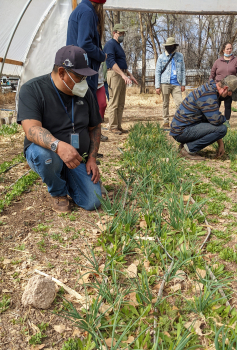NCAT and the United States Botanic Garden (USBG) are offering their popular veterans’ urban agriculture training in New Orleans in October 2024.
Armed to Urban Farm gives military veterans an opportunity to see sustainable, profitable small-scale farming enterprises and learn about urban farming as a career. Armed to Urban Farm will include a week of engaging classroom sessions, farm tours, and hands-on activities in New Orleans.
Armed to Urban Farm participants will learn about whole-farm planning, farm financial planning, urban crop production, urban soils, marketing, and more. Participants will gain a strong foundation in the basic principles of operating a sustainable urban farming enterprise. In addition, attendees will join a nationwide network of supportive farmer-veterans and agricultural advisors.
Instructors will include NCAT sustainable agriculture specialists and U.S. Department of Agriculture agencies. Attendees will also learn from producers experienced in an urban setting.
Veterans can complete the online application HERE. The deadline to apply is August 30.
The program is available to military veterans who are interested in starting an urban farm or who are beginning urban farmers (less than 10 years). All veterans are welcome to apply, but those from the Southeast region will receive priority. Spouses and adult farming partners are welcome as well but must submit separate applications. Selected participants will be notified by September 6.
Dates, Location, and Cost
The training will take place October 7 -11, 2024, in New Orleans, Louisiana. The event is free for those accepted to attend. Lodging, transportation to local urban farms, and most meals will be provided. Participants must pay their own travel costs to and from the event, but travel scholarships are available through a partnership with Ranchin’ Vets. Information on travel scholarships will be provided upon acceptance to the training.
Hosts
NCAT and the USBG, partners in this program, will organize and host the Armed to Urban Farm event in New Orleans.
Questions?
Please contact Andy Pressman, andyp@ncat.org or (479) 587-3475.

 “It was cool to see and hear stories about how farmers started similar to where I’m at right now and how they learned to use grants, have the drive, and make it a business,” he says. “I loved the training; it was amazing.”
“It was cool to see and hear stories about how farmers started similar to where I’m at right now and how they learned to use grants, have the drive, and make it a business,” he says. “I loved the training; it was amazing.”